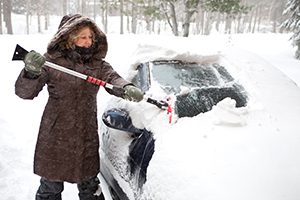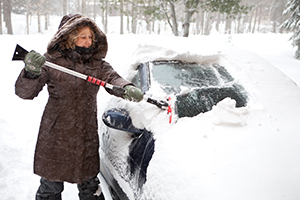 *** We originally published this article in February 2013. Almost a year later, the Midwest is in the middle of another major winter storm, with more snow likely to come before spring arrives. Accordingly, this is a perfect opportunity to republish this time-sensitive article. ***
*** We originally published this article in February 2013. Almost a year later, the Midwest is in the middle of another major winter storm, with more snow likely to come before spring arrives. Accordingly, this is a perfect opportunity to republish this time-sensitive article. ***
When there’s a foot of fresh snow outside and the workday will be starting in only a few hours, many employers are faced with the question of whether they will be opening for business for the day. For those who do open for business, do they have to pay employees who can’t make it out of their driveways? If they decide to keep the doors closed for the day, do they still have to pay employees who get to go sledding on the nearest hill? Fortunately, some guidance has been provided by the U.S. Department of Labor (“DOL“) as such questions give rise to whether certain employer decisions to pay or not pay result in a violation of the Fair Labor Standards Act (“FLSA“).
Nonexempt Employees
Under the FLSA, an employer is generally required to pay nonexempt employees (those paid hourly) for only the time worked. That is, if the nonexempt employee shows up to work but is told to return home, the nonexempt employee is not required to be paid. Furthermore, employers are not required to keep nonexempt employees for any specific number of hours or to pay them for hours that they were assigned to work but didn’t. In addition, if nonexempt employees are permitted to leave at their option when the business will remain open, they will not be paid during the time off. However, if employees show up to work and stay while weather conditions are being assessed, but don’t work, they are required to be paid. Lastly, if the business is closed, the nonexempt employees under the FLSA are not required to be paid.
Exempt Employees Generally
Matters become more complicated in the case of exempt employees. The FLSA generally requires that a minimum wage and overtime pay be paid to employees unless an exemption applies. One such exemption is when an employee is employed in a bona fide executive, administrative or professional capacity and the employee qualifies under the numerous tests under the FLSA relating to duty, salary level and salary basis. One such test to determine if an employee meets the exemption, or is an “exempt employee,” requires that the employee be paid on a salary basis. Generally, to be considered to be paid on a salary basis, the employee must regularly receive each pay period a predetermined amount of compensation which is not subject to reduction because of variations in quality or quantity of work performed. If an employer makes a prohibited deduction, an employee may not be considered exempt, which will then cause the employee to be entitled to a minimum hourly wage or overtime pay.
However, there are limited exceptions with respect to the ability of the employer to make deductions from an exempt employee’s salary. One such exception is that a deduction may be made when an employee is absent from work for one or more full days for personal reasons, other than sickness or accident.
Employer’s Office Remains Open
If an employer’s office remains open during inclement weather, exempt employees who do not show up for work may receive a deduction in their salaries for the full day. This is because the DOL considers an absence due to adverse weather conditions as an absence for personal reasons and not an absence due to sickness or disability. However, if an employee misses one and a half days of work due to the weather, the employer under the FLSA is only permitted to deduct one full day’s salary—deductions for less than a full day’s absence are not permitted.
An employer may require that the exempt employee use vacation time or cause a deduction from a leave bank account for the day the employee is unable to arrive to work due to inclement weather. The FLSA does not require employer-provided vacation time. As such, where an employer has a bona fide benefits plan, it is permissible for the employer to substitute or reduce accrued leave in the plan for time that the exempt employee is absent from work, even if it is less than a full day, as long as the employee continues to receive an amount equal to the employee’s guaranteed salary.
Employer’s Office Closes
If an employer decides to close the office due to inclement weather, exempt employees must continue to receive their full salaries without deductions. However, the employer may require that employees use vacation time or debit their leave bank account whether for a full or partial day’s absence, provided that the employees receive an amount equal to their guaranteed salaries.
Importance of Having a Policy
It is important that the employer establish a policy covering situations like those addressed above—don’t wait until you are snowed in to start putting together your policy. It is important that such a policy be in place before the big snowstorm, that the employees are notified of the policy and that it is implemented properly and consistently so as to not run afoul of the FLSA or other state wage laws.

